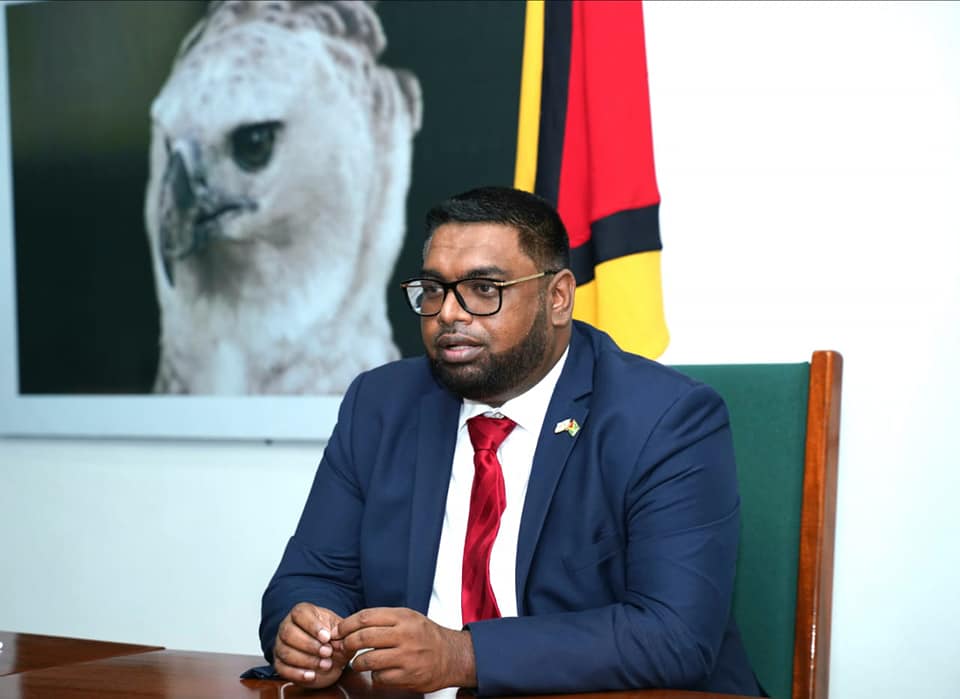Addressing the 75th session of the United Nations General Assembly yesterday, President Irfaan Ali made a strong defence of multilateralism in addressing questions surrounding Guyana’s territorial integrity, climate change and the raging COVID-19 pandemic.
In a copy of his virtual remarks released by the Ministry of Foreign Affairs, Ali said “My government assumed office on the 2nd of August this year. I take this opportunity to commend the international community, including the United Nations for defending the democratic rights of our citizens”.
He asserted that his government is committed to “greater political inclusion and to enacting institutional reforms to ensure that democracy, the rule of law and constitutional rights are respected. My Government recognizes the dignity and worth of the human person and is determined to secure for the country’s citizens a higher standard of living”.
Noting that every nation, no matter how large or small, has but a single vote within this Assembly, Ali said that the General Assembly remains an invaluable forum where small states can make their voices heard and unite for their mutual advantage.
He said that developing countries continue to face constraints associated with limited access to development financing.
“Improved access to such financing is vital for the realization of the Sustainable Development Goals. The United Nations must continue to champion the need for great access to development financing for developing states”, he said.
Ali added that the UN has a special duty to ensure that members’ obligations under international agreements are fulfilled and that setbacks in meeting commitments are reversed.
He said more than ever, “we need a resurgence of political will and commitment to protect the multilateral architecture and institutions, including the International Court of Justice (ICJ). Guyana reposes confidence in this institution. We are committed to the rule of international law, inclusive of the peaceful resolution of disputes”.
Ali pointed out that in March 2018, Guyana filed its application at the ICJ seeking an affirmation of the validity of the 1899 Arbitral Award and the international boundary that it established with Venezuela.
“We are happy to report that on the 30th of June, 2020 the ICJ held its first virtual hearing on the controversy involving Guyana and the Bolivarian Republic of Venezuela. Regrettably, Venezuela has refused to participate in the hearing. Guyana now awaits the determination of the ICJ on whether the Court has jurisdiction to proceed to hearing the merits of the case”.
On COVID-19, Ali said that the pandemic had launched an attack on the health and well-being of the people while the economy has also become a casualty.
“More than ever, the resolve of the United Nations is being tested and it is evident that no single country can overcome the debilitating effects alone. This reality must inform the trajectory of the United Nations so that it can support the efforts of developing countries to rebuild and to become more resilient.
“A strong multilateral system is required for collective action to stem this pandemic. I acknowledge the support of UN agencies in my country’s response to the COVID-19 crisis. We trust and support the efforts of the UN system to ensure fair, transparent and timely global access to preventive tools, equipment and materials for testing”, he said.
Competing with and compounding the pandemic is climate change, he said.
“Every year is another record breaking year for extreme weather conditions and climate events. As a low-lying coastal State, Guyana, is acutely aware of the high toll of these extreme weather conditions. But equally costly is climate resilience. Developing countries are thus set between a rock and a hard place. The only way to ease this burden is through concerted and balanced climate action, especially via mitigation, climate financing, technical cooperation and capacity building. We also urge all States to set ambitious targets in their Nationally Determined Contributions under the Paris Agreement and to work earnestly towards them”, he said.
He added that Guyana’s Low Carbon Development Strategy (LCDS) reflects its national development agenda.
“The strategy will ensure that we fulfill our Nationally Determined Contributions (NDC) and place our country along a path of sustainable and climate-resilient development”, he added.
The President did not mention that Guyana had become an oil producing country in December of last year and has since had billions of cubic feet of gas flared by ExxonMobil offshore.
This will certainly distend the NDC.
He added: “Multilateralism is the pathway to achieving our ends. We must collectively work to preserve this instrument and to strengthen the United Nations as we build a better world for our generation and those to follow”.





